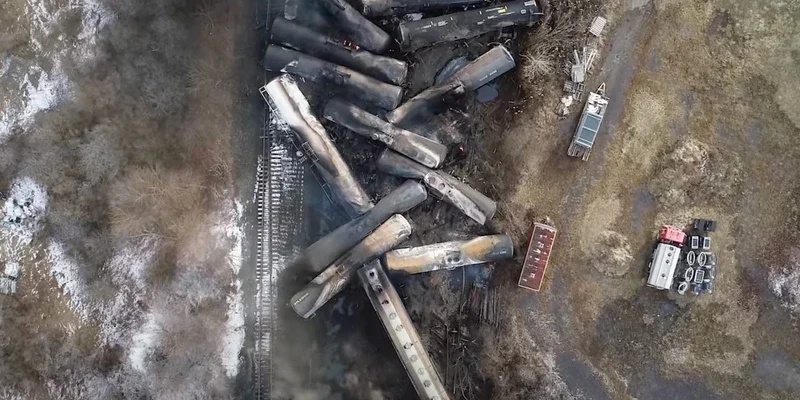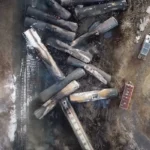When a toxic train bomb hits your city
AMY GOODMAN AND DENIS MOYNIHAN
On February 3, a massive train derailment in the town of East Palestine, Ohio blanketed the city in a toxic mix of chemicals and spilled gases, polluting the air, polluting waterways and killing thousands. of fish and frogs. Local residents suffer ailments ranging from shortness of breath, sore throat, burning eyes and rashes, all with unknown long-term consequences.
The two-mile long freight train was operated by the Norfolk Southern Corporation. It has been called a “bomb train” as among its 141 carriages were tankers that can hold up to 32,000 gallons each of highly flammable, toxic chemicals. In addition to the spill, a wildfire raged for days, followed by a "controlled" burning of the train's most toxic cargo, releasing a huge mushroom cloud of fire and smoke. This catastrophe could have been avoided, had it not been for lax regulations and the enormous lobbying power of companies like Norfolk Southern.
Five days after the accident occurred, local residents who had been evacuated were told it was safe to return home. This did not sit well with Emily Wright, who works for River Valley Organizing, a community group in the Ohio River Valley, which includes the city of East Palestine.
“There are five miles between where I live and where the derailment happened,” Wright told Democracy Now! “You should be fine [the officials said]. They kept saying the same thing over and over again in the media and at press conferences: 'There are no toxins in the air. There are no toxins. Don't worry'."
Despite official assurances, Emily Wright was concerned. “We started out at my house experiencing nausea, -sorry to be explicit, but- diarrhea. My father has bilateral asbestosis from working in the factory. So these industries are killing us in more than one way. And he couldn't breathe well.
By this time, the risk of exposure had increased, as had fears of a potentially massive explosion. So Wright and his neighbors were told to "shelter in place."
“Twenty-five million Americans live in a chemical train blast zone,” Emily Wright continued, “This is in one of the poorest parts of America, from Conway, Illinois, to Pennsylvania, across the Appalachian Mountains. You know, they continue to do, you know, security issues, lower security concerns, they don't care about us, because we're the people who historically can't defend themselves."
Although the train was two miles long, heavy, and carrying a dizzying array of dangerous chemicals, its braking system was based on technology dating back to the Civil War. This braking mechanism works like bumper cars, when the front engine slows down, the rear car crashes into it and brakes, and so on. A much more modern and effective braking system, known as ECP , for “electronically controlled air brakes”, is already in use. Amtrak passenger trains have this system, as do trains that carry nuclear waste.
As The Lever News reported in the wake of the derailment, in 2014 the Obama administration enacted a rule, set to take effect in 2023, that would have mandated ECP brakes. en trains carrying the type of hazardous materials in this latest train bomb. Norfolk Southern and other industry leaders contributed more than $6 million to Republican campaigns while lobbying against the rule. In 2018, the Trump administration suspended it. The Biden administration and Transportation Secretary Pete Buttigieg have to date done nothing to reinstate it.
In addition to blocking safety rules, Norfolk Southern and other rail giants have been cutting costs to boost profits.
“The root of all of this is downsizing,” Ross Grooters, a locomotive engineer and co-chairman of the Railroad Workers United union, told Democracy Now! “You have companies that are making obscene amounts of money…you have fewer people doing a lot more work, faster. You have general cuts in wagon maintenance, in locomotive maintenance, in track maintenance. This is critical infrastructure. And then you have increasingly longer and heavier trains, like the one we saw here, that have a higher propensity to derail.”
As the Lever News investigation revealed, while lobbying to block safety rules, arguing that braking systems, for example, would be too expensive to implement, Norfolk Southern spent $1000 billion on share buybacks to boost the price of his actions.
Meanwhile, the residents of East Palestine, and many more in an area increasingly affected by this massive toxic spill, have been left drinking bottled water while being reassured that all is well.
“We really need a federal emergency declared,” Emily Wright said again, the day the administrator from the Environmental Protection Agency (EPA) , Michael Regan, visited East Palestine. “We need the Federal Emergency Management Agency (FEMA) here. There are short-term and long-term effects that will be some of the largest this nation has ever seen from a train derailment."










